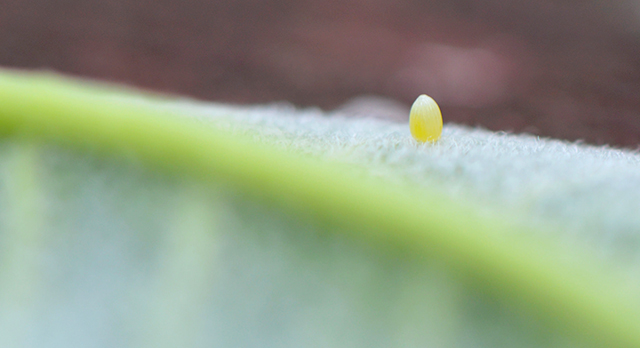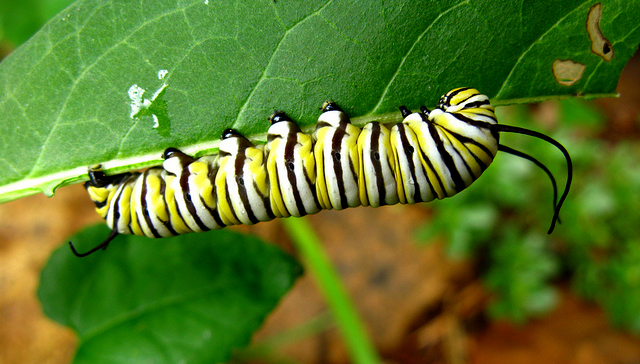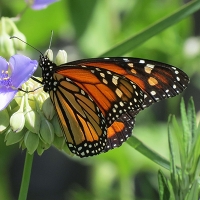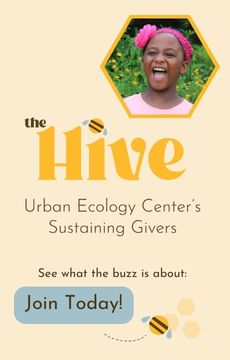While out conducting a monarch larva survey along the Oak Leaf Trail, I stumbled into a shallow hole next to a milkweed plant at the same time three bikers were approaching me. I ridiculed myself silently for not minding my footing better, when I noticed the bikers, now next to me, were actually three bike cops. Assuming they were going to give me a hard time about falling in the hole, they passed me instead joking about “how my garden grows?” I dismissed them with a simple “pretty well,” leading them to pursue the joke further asking what was growing in my garden. When I told them I was actually looking for monarch butterfly eggs, their eyes lit up. They quickly turned their bikes around, and rolled over to the milkweed plants my volunteer and I were monitoring.

A tiny monarch egg on the leaf of a milkweed plant. Photo: Joanna Gilkeson/USFWS
Being the daughter of a policeman, I was not surprised that they fell victim to their own “cop curiosity,” but what did surprise me was the degree to which they fell. I realized this wasn’t the average passer-by inquiry when they dismounted their bikes and parked them off the trail. They starting asking about the project, for who I was conducting the survey, the monarch population in Wisconsin, the butterfly lifecycle and the appearance of butterfly eggs. The rapid-fire questions continued for several minutes when Officer Marq, the ring-leader of the interrogation, finally confessed to me that he had grown up in the mountains in Mexico where the adult butterflies overwinter. He described to us all the wonder of the butterfly overwintering grounds and shared with us how he goes home every winter to visit family and view the beautiful butterfly trees.
Thinking that this was probably the end of our conversation, I asked them if they wanted to see the monarch egg I had had just found right next to where they were standing. Not even a moment’s hesitation passed before they were taking turns to view the pin head-sized egg. They each knelt down in the milkweed, using my hand lens to get a closer look. They used the field guide pictures to confirm that what they had just seen was indeed an egg. And then without prompting, they began scanning other milkweed plants for eggs insisting on contributing to our research project.
Officer Ron seemed pretty intent on finding a caterpillar and led the troupe on the new quest to find a caterpillar. Not wanting to dissuade the cops, my volunteer and I also wanted to offer a bit of reality. We explained how we typically only find two or three caterpillars a survey and often times they are so small that they are overlooked. Of course before we finished saying this, Officer Ron points down at a milkweed plant and said “is that one?” When we confirmed that it was indeed a tiny, 2 mm long 1st instar he turned giddy and asked if we could name it “Little Ron.”

A monarch larva similar to "Little Ron."
During our 15 to 20 minutes together, we discussed lots of things from Queen Anne’s lace to UEC memberships to hosting the police academy on the climbing wall. And as they were happy to point out, they also identified all three stages of the monarch lifecycle together. Officers Ron, Marq and Keith were pretty cool guys and I hope you get to meet them some day. In fact, Officer Keith said he wanted to come by some time to purchase a membership. And who knows, maybe Officer Marq would be willing to host us in the mountains of Michoacán one winter. I get excited just thinking about the impacts this one special moment might have created and not to mention, the sheer splendor of sharing something so awesome with three beat cops. It’s not an experience you have every day.





